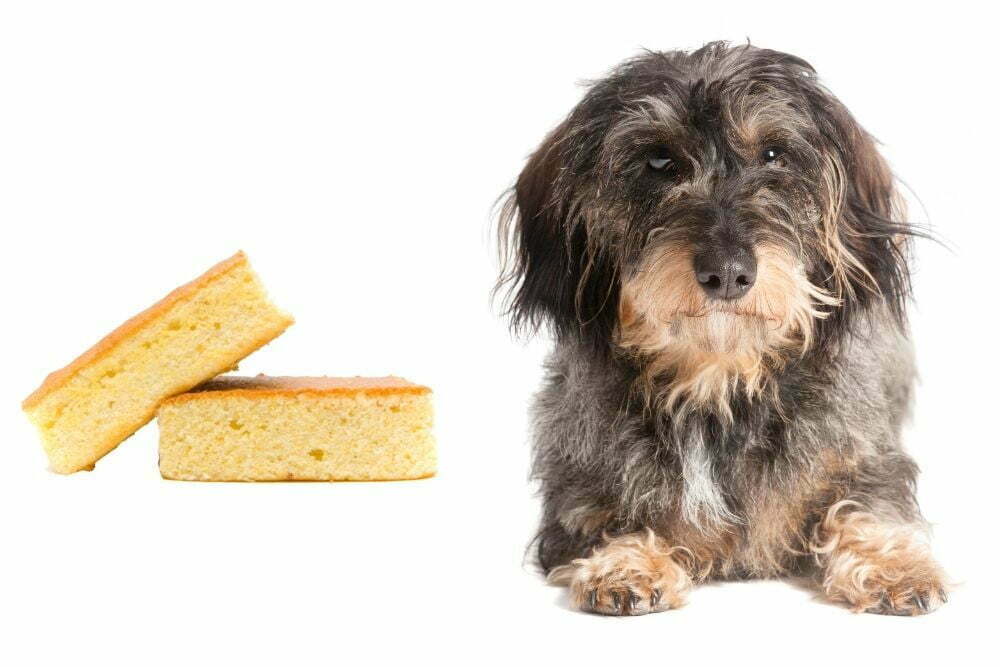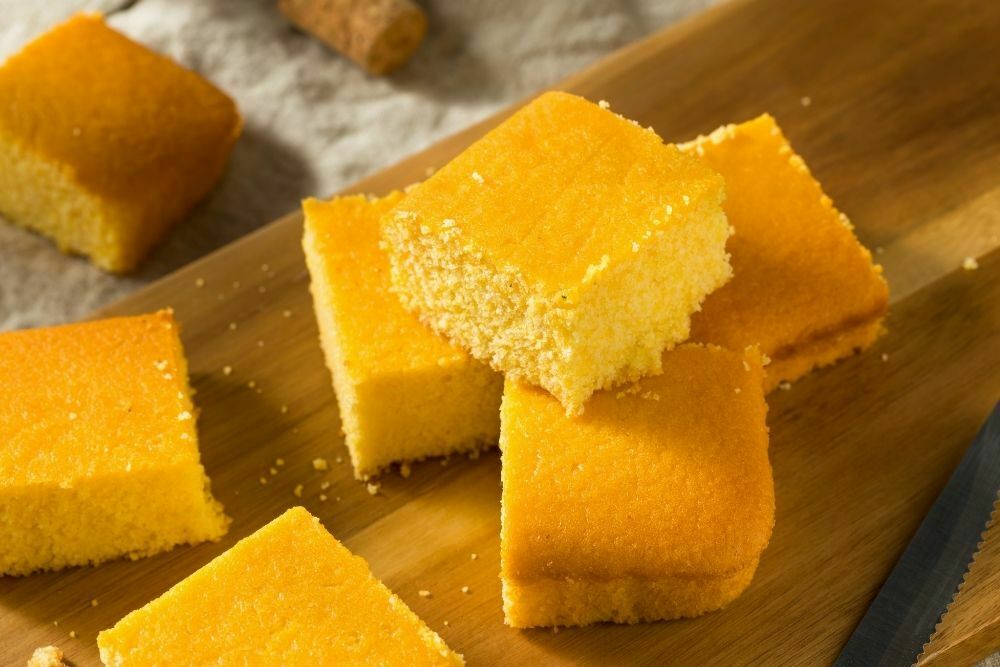All cornbread is authentic as long as it’s good, hot, and made with love and fresh ingredients – Jeremy Jackson
Cornbread is a dinner table institution in the South, and there isn’t any meal that can’t be served with and won’t improve.
Okay, so maybe we’re a little biased toward cornbread, as we were raised on it and serve it with just about everything that we whip up in the kitchen, but it doesn’t change the fact that it’s our indispensable comfort food.
And we’re not the only ones who think about cornbread that way, our dogs do too. Every single time, without fail that they smell cornbread in the oven, our hounds gather in the kitchen and wait expectantly for it to arrive.

While it’s cute and more than a little endearing that they’re so enamored with our cornbread, we’ve always wondered whether or not our dogs could and should actually eat it and if it’s good for them or possess any potential threats to their general wellbeing and long term health.
You’ve probably asked yourself the same thing after being hounded by your dogs for a taste of cornbread when it ends up on your table, which is why, we’re guessing, you’re here. Try to discover whether it’s okay to share your cornbread with your four-legged friends.
After a little due diligence and thorough research, we’ve found the answers that we, and you were, and are looking for. It’s time to find out everything you need about your dog and cornbread…
Is Cornbread Safe For Dogs? Can They Eat It?
Let’s cut straight to the chase, avoid all of the flim-flams and just answer the question, shall we? And the answer is yes, and yes, it is safe for your dog or any other dog to eat cornbread.
There are, however, as there are with everything in life, a number of caveats that you’ll need to be aware of and think about if you’re going or intend to give your dog more than the occasional piece of cornbread.
The everyday ingredients of the beloved Southern staple, cornmeal, flour, salt, sugar, eggs, and baking powder, do not pose any significant threat to your dog.
There is a valid argument about adding too much sugar or salt to their diet, neither of which are particularly good for your hound in large quantities, but the amount found in cornbread doesn’t actually cross the unhealthy threshold or venture anywhere near dangerous territory, it’s okay to share a piece of cornbread with your dog at mealtime.
Is Cornbread Good For Dogs?

We hate to burst your bubble or shatter any long-standing illusions that you might have about the supposed health benefits of cornbread, but the simple truth is, cornbread isn’t good for you or your dog.
It isn’t awful for either of you either; it’s more of a middle ground sort of food that doesn’t pose any risk or harbor any secret health benefits.
It’s solid, carb-heavy food that’ll fill you up, and, as an added bonus, it tastes good too. And like everything else that lands on the dinner table, if you or your dog eat too much of it, you’re likely to pile on more than a few unwanted and unnecessary pounds.
The Allergy Issue
Just like us, dogs can suffer from food allergies and intolerances, and if your furry pal has shown any signs or symptoms of either corn or wheat intolerance in the past, then, unfortunately, he’s not going to be able to eat cornbread, and if he does, it’s probably going to make him sick.
Why? Because the flour that’s used to make cornbread contains wheat, and as its name rightly suggests, cornbread’s overriding ingredient is cornbread.
If you’re unsure whether your dog does suffer from any food allergies or intolerances, you can always ask your vet to check for both. It isn’t going to be cheap to run the tests and find out, and they will leave a painful dent in your pocketbook, but it’s always better to be safe than sorry, isn’t it?
And The Complications
Plain, good old-fashioned cornbread is, as we’ve already said, perfectly safe for your dog to eat, but the problem is everyone tends to have their own spin and take on it. And that’s where things can tend to get a little complicated, at least as far as dogs are concerned. It’s the extra ingredients that individual cornbread recipes include that turn their tummies inside out and upside down.
So what ingredients should you avoid if you want to ensure that your cornbread is safe for your dog to eat?
Onion and garlic are right at the top of the list, as they’re both toxic to dogs; chilis and peppers aren’t especially friendly to your best pal’s stomach and can cause nausea and diarrhea and cheese, much as dogs seem to adore it, isn’t great for them as a lot of canines are lactose intolerant.
Even a little cheese can make them violently ill, so it’s always better to avoid adding it to anything that your dog seems to be particularly fond of eating and enjoys.
Dogs And Cornbread – The Final Word
There are a couple of key factors to remember when it comes to cornbread and dogs, and as long as you follow them, it’s wonderful and safe to feed them to your hound.
First, it’s all about moderation, as a little bit of what he fancies and enjoys won’t harm him. As long as the treats that he gets from the dinner table don’t make up more than ten percent of his diet (and that includes cornbread), then your boy will be well within the safe “junk food” parameters, and neither he nor you will have anything to worry about.
And secondly, and lastly, as long as the cornbread that you serving is just the good-old, fashioned plain as the day is long variety, it’s absolutely safe for your boy, and you can slip him the odd slice, or piece (depending on how you cut it up and serve it when it’s ready) from the dinner table.
